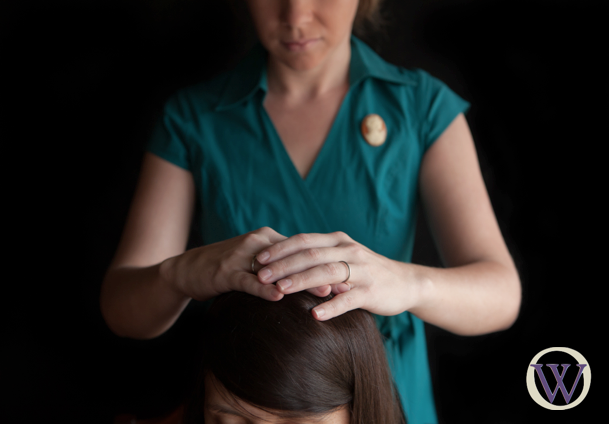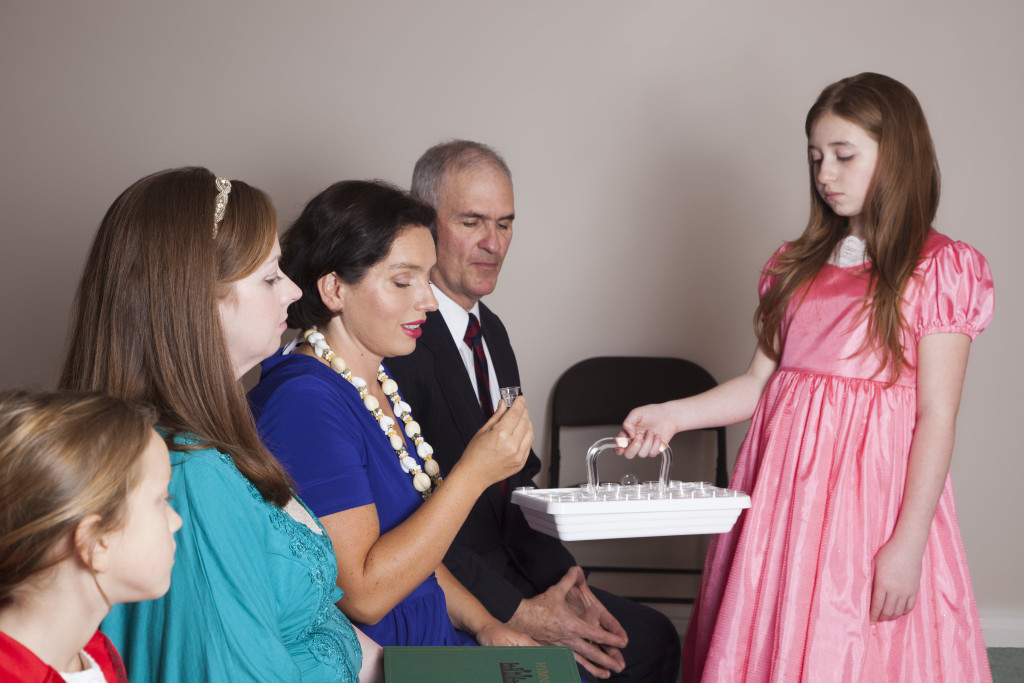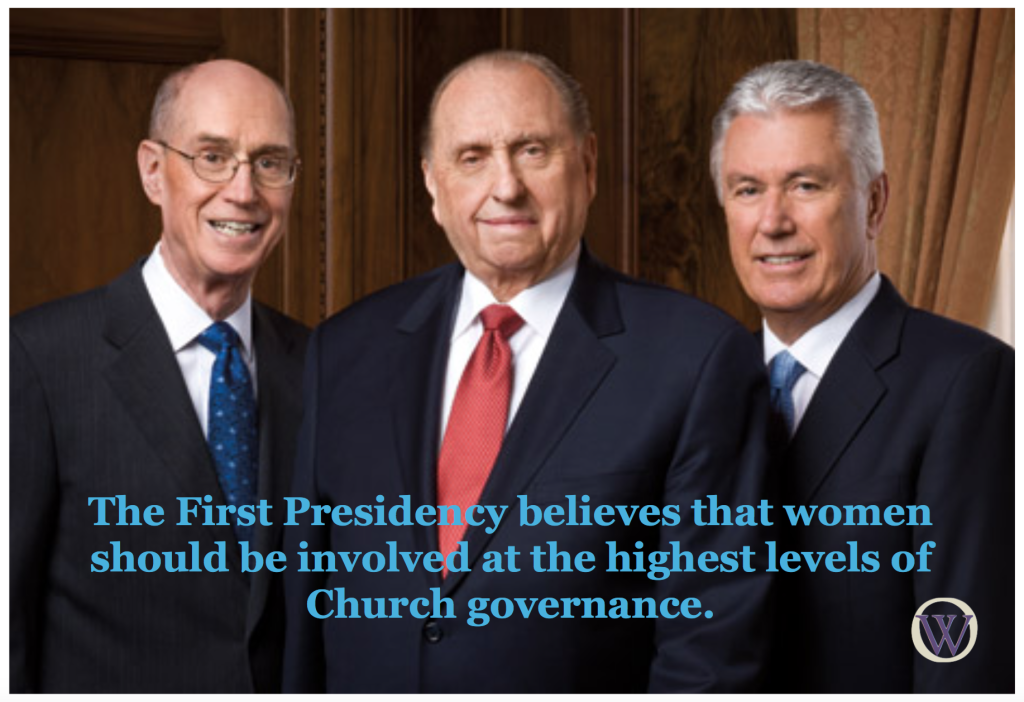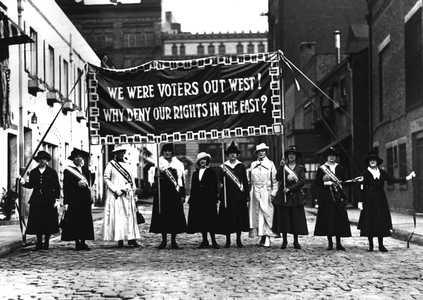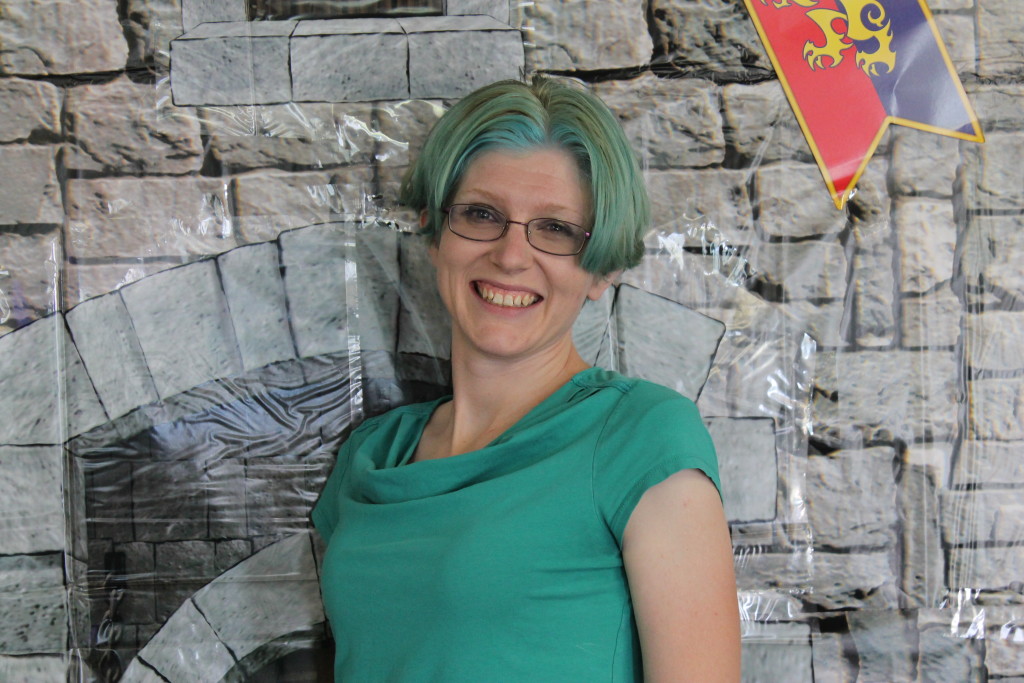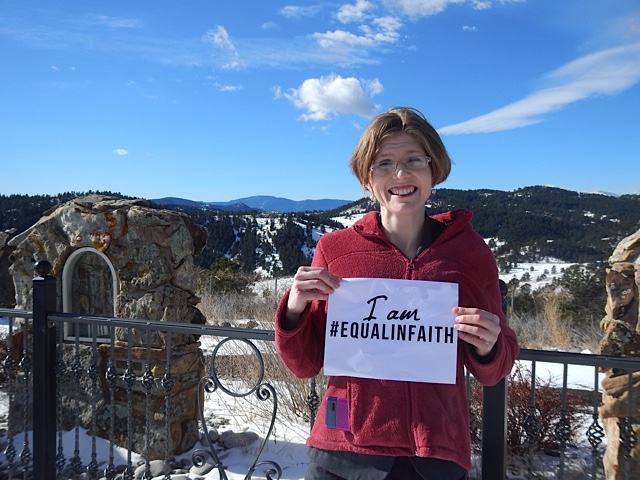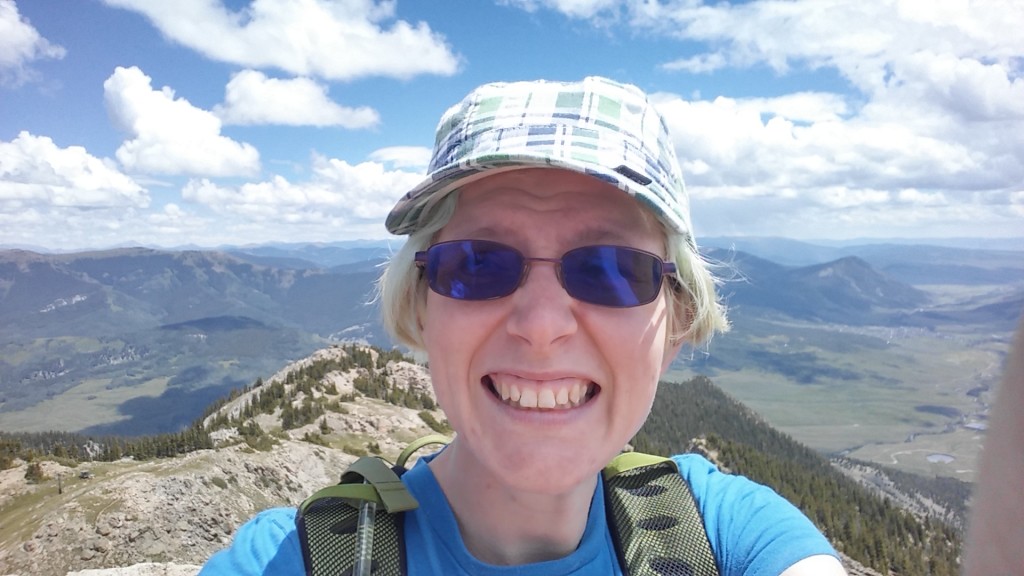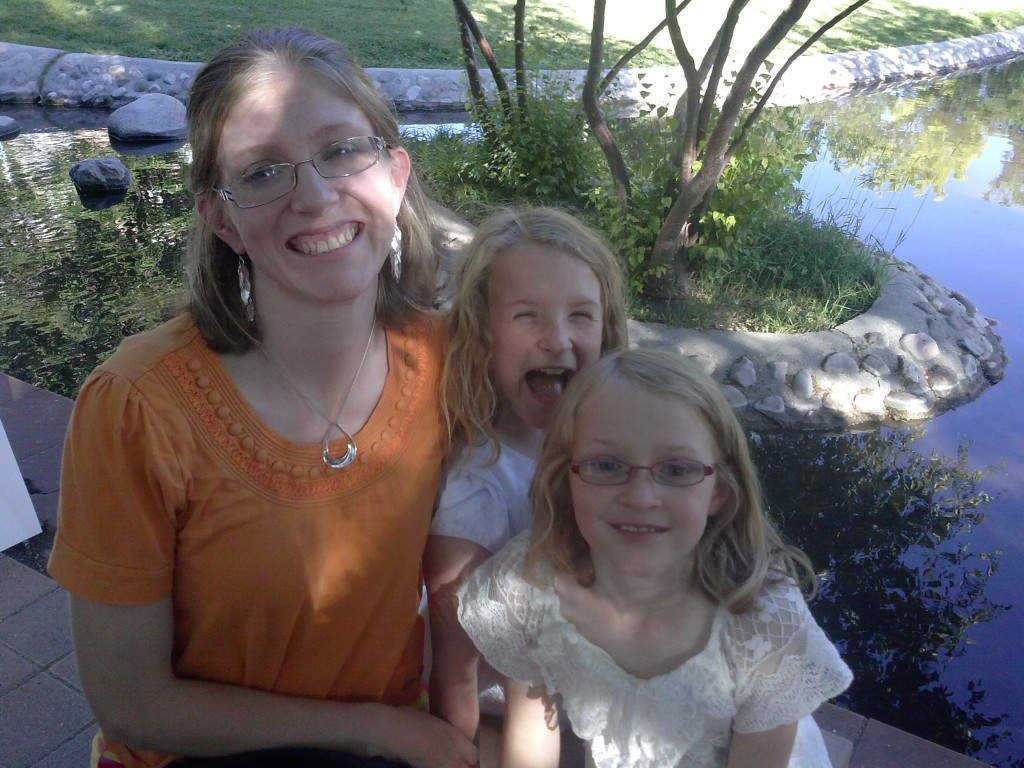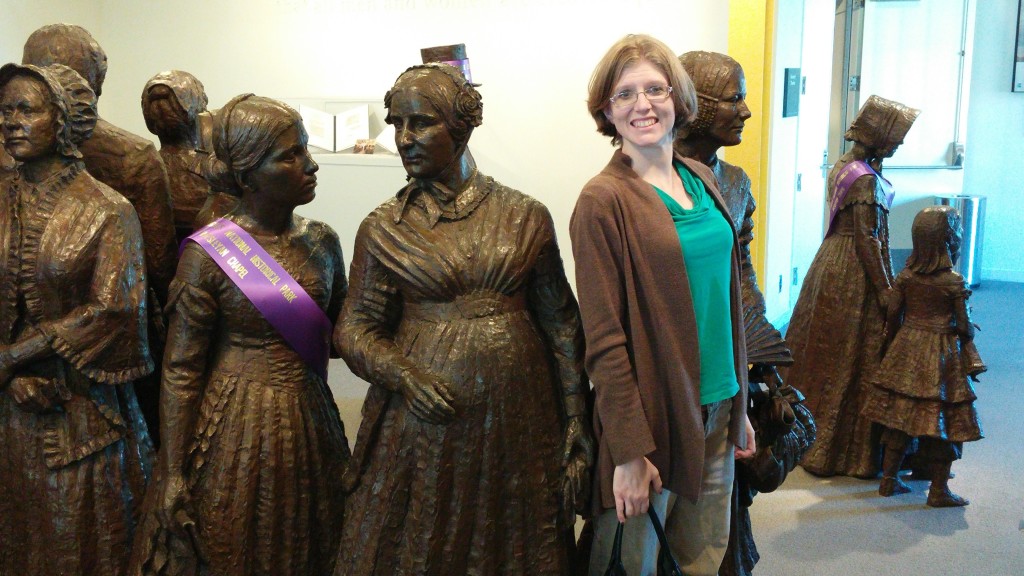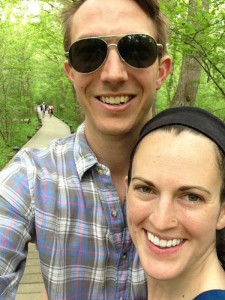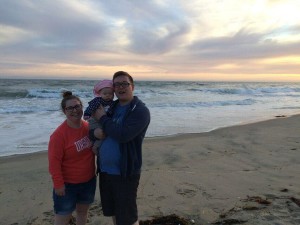October 2015 Action Plan
Ordain Women seeks to honor the voices of LDS women past and present and we look forward to the day that those voices and spiritual experiences are not diminished based on gender. In keeping with our theme for this year—Honoring our Past, Envisioning our Future—Ordain Women’s October 2015 Action will create a number of “living picture” representations of scenes from LDS history to highlight the diverse ways in which Mormon women have historically exercised their faith, participated in the Church, and spread the gospel. Some examples might include women blessing the sick, young women passing the sacrament, and women preaching to both men and women.
These scenes will be recreated in public spaces around Temple Square and the LDS Conference Center in Salt Lake City, Utah on Saturday, October 3, 2015, where people will be gathered from all over the world for the 185th Semiannual General Conference of the Church. This is an opportunity to help all church members understand our own history and envision a future in which women are more active participants in ordinances, governance, and missionary work, as they have been in the past but are not presently.
We invite you to join us on Saturday, October 3, 2015 in various locations around Temple Square. There are many ways to participate. We need people willing to be in scenes, help with props and costuming, people to help stage-manage and others to mingle and interact with passers-by.
For more information and to RSVP, please visit our Facebook event page https://www.facebook.com/events/1616169135325369/ .
There will be expenses incurred with this event for supplies, rental space, permitting and photographing. Your generous support is essential to this project. Please donate to the Go Fund Me campaign specifically or click on the donate button at the top of this page to help out financially. Thank you!
Serving with Women. A Male Ally Perspective.
The Church of Jesus Christ of Latter-Day Saints (“the Church”) recently released a statement announcing that women have been appointed to three of the Church’s general councils for the first time in its history. The importance of this announcement should not go unacknowledged. This is as or more important than when Sister Jean A. Stevens prayed at General Conference in April 2013- the first time that a woman prayed at the Church’s semi-annual General Conference. About the recent announcement, the First Presidency stated, “We are confident that the wisdom and judgment of these general auxiliary presidents will provide a valuable dimension to the important work accomplished by these councils.” The word that has stuck with me from that statement is “dimension.” Here, we have the highest body of the Church acknowledging that the perspective of women will enrich the general discussion occurring in these councils. Sister Bonnie L. Oscarson called the move “another significant moment” in the development of the Church. It is a sign that the First Presidency believes that women should be involved at the highest levels of Church governance.
As I considered the implications of this idea, I realized that Church leadership and Ordain Women are like-minded on this issue. There is admittedly a place where Ordain Women’s views diverge from current Church policy and that has led to an assumption that disagreeing with the Church’s current policy is apostasy. What if I told you that a modern Prophet and President of the Church has made a statement to the contrary? That man was the beloved Gordon B. Hinckley. In an interview with the television show Compass which aired on November 9, 1997, President Hinckley was asked if the rules prohibiting female ordination to the Priesthood could change. He stated that such a change would take a revelation and further clarifying, “But there’s no agitation for that. We don’t find it.” In line with that statement, Elder Dallin H. Oaks stated, at the April 2014 General Conference, “But even though (the First Presidency and the Quorum of the Twelve) hold and exercise all of the keys delegated to men in this dispensation, they are not free to alter the divinely decreed pattern that only men will hold offices in the Priesthood.” Such a change, as President Hinckley pointed out, would have to come from God. Ordain Women is a group that is agitating for a revelation on this matter, consistent with President Hinckley’s statement. Such requests for revelation were common in Joseph Smith’s day. In fact, a large portion of the Doctrine and Covenants comes directly from requests for revelation taken to the Prophet. In our day, we cannot simply walk-up to the Prophet on the street and ask our questions; a lot has changed since the 1800s. Ordain Women was organized by a group of faithful LDS women, to take this request to the Prophet. It is important that this question comes from the women seeking ordination.
But what does that mean for the men who support this endeavor? BEING AN ALLY For many men, especially in the Church, being a feminist ally can be an intimidating undertaking. The terms used can be confusing, you can feel unwelcome and some of the core feminist concepts can even seem accusatory toward you. There may be voices around you (including female voices) who say that feminism is unnecessary. Some people can even make allegations that supporting feminist causes is tantamount to apostasy. For me, it helped to clear the white noise and ask a few basic questions. They are:
1. Do you believe that men and women are fundamentally equal and have the ability to make equally valid contributions to society?
2. Do you believe that the Church is better when both men and women contribute their perspectives and talents in an effort to make the Church a better place?
3. Do you believe that women who desire an opportunity to do more to help the Church should be allowed that opportunity?
If you answered “Yes.” To those questions, you are a feminist ally! There is no pressure to agree with every idea in the vast realm of feminism. If you believe in the inherent equality of men and women, you are a feminist ally. Though that title sometimes carries some negative subtext, you don’t have to accept that. The First Presidency just took steps that show that they hold those same values to some degree by including women in the general councils of the Church. You’re in good company. Being a feminist ally can take on a number of forms. Some feminist allies choose to speak-up to support equality in conversations with friends. Some feminist allies will take steps to publicly declare their beliefs, like submitting a profile or donating to Ordain Women. Some feminist allies simply choose to remain silent. Others choose to involve themselves in causes that advance ideas that they believe in. What is important to remember as a feminist ally is that it is not an all or nothing proposition. Supporting equality doesn’t mean you have to believe every feminist concept. You don’t have to put messages on your Facebook wall for the world to see, if you are not comfortable with that. You don’t have to choose between Ordain Women and the Church. The picture has been painted that these are two distinct and competing entities. That is simply not true. Though many members of the Church disagree with the ideas presented by Ordain Women, I have found that those who disagree still have a strong desire to make the Church a better place. This bears repeating because I believe that this concept is critical to establish charity from both sides of the discussion: the average member of the Church and the average member of Ordain Women each have the best interest of the Church at heart. One of the most important aspects of feminism, in my view, is that it supports the rights of individuals to make choices consistent with their own beliefs. It empowers people to follow their own conscience. If your conscience tells you that supporting equality is important, know that your contributions as an ally would be welcomed at Ordain Women. As an ally, your support of the women asking for change is an important part of the process of faithfully agitating.
Honoring the past,
Envisioning the future.
Cory Hurle, the author of this post, is on Ordain Women’s Male Allies Committee.
Sunday Spotlight – Jeremy
As time passes, our culture seems to become increasingly aware of the numerous perspectives and the multitude of experiences that are possible for people in this life. Biological sex, gender, gender identity, gender expression, and sexual orientation are a lot more varied than we have previously realized, perhaps as varied as the wide pallet of skin hues around the world. This realization has helped me process the fact that there may be a reason I have rarely identified or understood the perspectives and experiences of other men. I may be biologically male, but I’m not sure that I fit or perfectly align with the socially constructed concept of what it means to be of the “male” gender. Thus, I don’t feel like a woman trapped in a male body, but I also don’t feel like a Don Juan or a Hulk Hogan either. I may have identified better with women my whole life because I may be somewhere in the middle of the gender spectrum, and I may just be closer to the female side of that spectrum than the male side, and I’m okay with it.
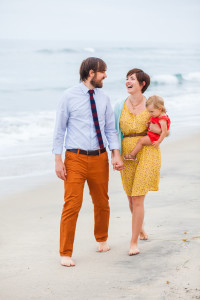
I remain hopeful despite the recent wave of excommunications against members expressing doubt, questioning the patriarchal institution, and advocating for women’s ordination because our church has a long history of members advocating for changes they perceived as unjust, unchristlike, and/or immoral. One such example was the prominent LDS sociologist Dr. Lowry Nelson, he communicated his difficulty in accepting a “doctrine of inequality” that resulted in “the Negroes [not being] entitled to the full blessings of the Gospel,” e.g. Priesthood ordination, after he was consulted over the existence of “pure white people in the rural sections” of Cuba to discover the efficacy of doing missionary work and the feasibility of establishing congregations in Cuba. Another example is the first wife of Orson Pratt, Sarah M. Pratt, who declined an offer from Joseph Smith to become one of his “spiritual wives” in 1841 Nauvoo, that encounter began a series of events that pushed her, her husband Orson Pratt, and their children in and out of the Church several times while Sarah advocated against the practice of polygamy in Nauvoo and Utah.
Additionally, I still hope that changes could be made to make the Church a more equal institution – more reflective of our Heavenly Parents, whom I envision as co-equally ruling over us, their creations. Firstly, having a two year old daughter, I would I like to see “worthiness” interviews for young women conducted by other women (e.g. Relief Society and/or Young Women’s Presidency members) instead of men. Placing older men in a room with younger women to discuss sexual relations, thoughts, actions, experiences, etc. doesn’t seem appropriate in any context. Ever. It carries the possibility of abuse by men who may knowingly or unknowingly develop a desire for such conversations and for creating circumstances for inadvertently causing unintended shame or unwarranted guilt.
Secondly, I would like to see the silence around Heavenly Mother lifted. A survey of historical teachings about Mother in Heaven conducted by BYU Professor David L. Paulsen and BYU student Martin Pulido found that Heavenly Mother may have and does play many roles beyond simply reproduction/nurturing, that the cultural “sacred silence” around Heavenly Mother does not appear to have been advocated for by any General Authorities at any time, and that the historical data from General Authority talks/statements provides a highly elevated view of Heavenly Mother and suggests that she fills a multitude of roles, such as procreator, parent, divine person, co-creator, co-framer of the plan of salvation, and as being generally involved in this life and the next.
Thirdly, I would like to see women be able to serve and/or assist in more callings and roles that don’t explicitly require ordination. For example, reducing gender disparity in leadership callings throughout ward/stake/church hierarchies, by calling women to Sunday School Presidencies, calling men to Primary Presidencies, calling women as Ward Mission Leader, etcetera. I would like to see women be allowed to serve as witnesses in baptisms, mothers be allowed to hold their infants during naming/blessing ceremonies, and women be allowed to, perhaps, serve in other priesthood calling/roles by granting Bishops and Stake Presidents the ability to call women to callings that make use of their Priesthood authority/keys, analogously to the work women do in the temple under the authority/keys of the Temple President.
I love that our Church is run by volunteers, which occasionally leads to problems, but forces us as members and forces our leaders to put a lot of reliance on the Holy Spirit, and allows for the hand of the Lord to be revealed. Henry B. Eyring talked about this sort of reliance when he discussed his experience after being released from a calling. A member sought his advice, and although he initially resisted, he finally listened to their problem and waited for the divine inspiration he was accustomed to receiving, only to have nothing come. I love being able to serve in the Church, and I currently serve in my favorite type of calling – teaching. I love the access to the spirit I end up feeling as I prepare and teach lessons.
U.S. Women’s Equality Day
August 26th is the anniversary of national women’s suffrage in the United States. The woman suffrage amendment was introduced for the first time to Congress on January 10, 1878, thirty years after the first major women’s rights conference in the U.S. at Seneca Falls, New York. According to the National Women’s Equality Museum website, the Nineteenth Amendment “was re-submitted numerous times until finally in June 1919 the amendment received approval from both the House of Representatives and the Senate.” During the next year, suffragists lobbied nationwide in order to obtain the required two-thirds of the states to ratify the amendment. “On August 24th, Tennessee, the final state needed for ratification,” narrowly approved ratification by one vote. “U.S. Secretary of State Bainbridge Colby signed the amendment into law on August 26, 1920.”
In doing so, the United States joined numerous other nations that had already granted women the right to vote, including New Zealand (1893), Finland (1906), Norway (1913), Denmark (1915), Iceland (1915), Estonia (1918), Hungary (1918), Poland (1918), the Russian Federation (1918), Austria (1918), Germany (1918), Ireland (1918), the United Kingdom (1918), Luxemburg (1919), the Netherlands (1919), Sweden (1919), and Lithuania (1919). Women’s suffrage in Australia (1902) and Canada (1917) excluded indigenous women until the 1960s.
Fifty years after the Nineteenth Amendment became law, Betty Friedan and the National Organization for Women (NOW) organized a nationwide Women’s Strike for Equality on August 26th, 1970. “Women across the political spectrum joined together to demand equal opportunities in employment, education, and twenty-four hour child-care centers. This was the largest protest for gender equality in U.S. history. There were demonstrations and rallies in more than ninety major cities and small towns across the country and over 100,000 women participated, including 50,000 who marched down Fifth Avenue in New York City.”
The following year, Representative Bella Abzug (D-NY) introduced a bill designating August 26th of each year as Women’s Equality Day in the United States. Passed by Congress, the bill asserted that “Women’s Equality Day is a symbol of women’s continued fight for equal rights.”
The movement for women’s rights continues. Ordain Women’s first Equal in Faith initiative, for example, cosponsored by the Roman Catholic Women’s Ordination Conference and Ordain Women Now of the Lutheran Church-Missouri Synod, took place on August 26, 2013, to draw specific attention to the national need for gender justice in religion. Why, we asked, when we increasingly expected equity in our secular lives, did we acquiesce to inequity in our religious communities?
This year’s Equal in Faith Fast for Gender Justice in Religion took place on International Women’s Day and was expanded to include a global audience. We hope all will join us in commemorating Women’s Equality Day in the United States and the continuing work for gender justice around the world by sharing the following video, prepared for the Equal in Faith initiative. And in September, Ordain Women hopes to highlight the history of women’s rights initiatives globally in a series of blog posts by OW supporters and those participating in the U.S. women’s history tour. Onward, sisters.
Honoring our past,
Envisioning our Future.
Lorie Winder Stromberg, the author of this post, is on the Ordain Women Executive Board.
Sunday Spotlight – M’lisa
Today’s inspiring Spotlight comes from M’lisa! While she doesn’t “desire” priesthood ordination she does see it as the only way for complete equality in the church.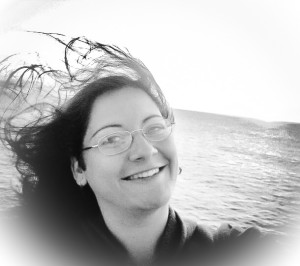
M’Lisa was born and raised in the Church. She graduated seminary, even earning a medal for placing 2nd in scripture chase. She earned her YW medallion, “graduated” from Girl’s Camp which entailed meeting certain goals and attending all years, and she was president of her Laurel’s class. M’Lisa married her husband in the San Diego Temple. She followed the path set out for her in the Church.
Her favorite calling was teaching the (combined) 14 & 16 year olds. She enjoys teens and would love to work with them again. M’Lisa loves the sense of community she found in the Church – no matter where you live, there is a community to give you sense of belonging.
There have been many times that she has experienced gender inequality in the Church and the first was probably when she asked why girls couldn’t pass the sacrament. Later when she was the Laurel president there it was again. She suggested that the Young Women do some activities the Priests had done such as tour the new fire station or have a sports night, only to have the suggestions shot down as being inappropriate for Young Women. When she asked why, she was told that the Young Women were only allowed to do activities that focused on “Personal Progress” which meant, essentially, fashion nights and makeup parties which were o.k. M’Lisa reasoned that if the boys could do it, why couldn’t the girls? She was told that if the boys wanted to “Ignore spiritually appropriate activities” that was on them, but the girls were going to focus solely on the spiritual.

These were not the only, nor were they the last experiences M’Lisa had with gender inequality in the Church. She also found the temple very troubling. She felt alone in her concern and she expressed to her husband how alone she felt and how she thought she was the only one who saw and was hurt by the inequality she saw all around her. She remembers telling her husband that it didn’t matter if an angel appeared to her and told her that things weren’t meant to be this way. She would be powerless to do anything about it.
M’Lisa appreciates the Doves & Serpents “Equality is not a Feeling” series as it articulates many of the things she has experienced.
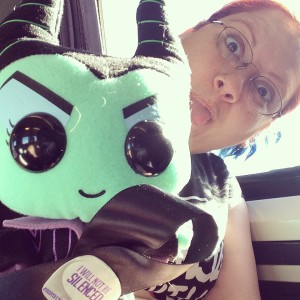
M’Lisa happened on a Salt Lake Tribune article about Ordain Women launch event and she followed the links to the main Ordain Women page and the Facebook page. That night she read through every thread on the Facebook page, she read every profile on the Ordain Women site, and everything else she could find. The entire time she argued with the Spirit; she didn’t want to join, she didn’t want to help because she didn’t want ordination to the priesthood at the time. She had the usual thoughts – too much work, right?! For three days she argued; she pleaded (don’t make me do this!) and finally she agreed to do things the Spirit was prompting. She submitted a hesitant profile and never looked back.
M’Lisa has attended every action except the first. By the third action – the second Priesthood action on Temple Square – she had submitted a new, stronger profile. She still doesn’t “desire” ordination but she does desire to have the power to make the kinds changes for equality that would require the kind of influence that only bishops and stake presidents have and that would require ordination to the priesthood. Although she was unable to attend the water bottle handout on the 24th of July, she plans to attend every action she can while she is living in Utah, because she doesn’t know if she’ll be in a position to attend any after she leaves. M’Lisa loves that she is setting an example for her daughter about standing up for what’s right and acting.
M’Lisa has been blacklisted for all intents and purposes by her ward for her activity in Ordain Women. Her bishop is a loving and Christ-like man who does what he can to help but he can’t make people like us. She’s been disowned by one aunt and another is obviously uncomfortable around her even if Ordain Women doesn’t come up. M’Lisa tries to be respectful of the discomfort of others and does not force the conversation on people. Her mother and many other family members just avoid the subject altogether. She does, however, have an ex-mo aunt who is amazingly supportive and even her ex-mo sister is supportive (even though she hates religion). Her other siblings are a mix of “don’t care” and “good on you.” Her Mormon friends are mostly supportive, her non-Mormon friends are mostly indifferent; they are glad that she’s standing up for what she believes but aren’t really otherwise interested.
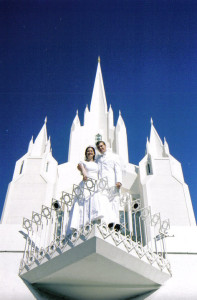
M’Lisa has not seen any changes in the perception of Ordain Women in her ward members or family and friends but she hears of conversations happening and reads about them on facebook. She sees that progress continues and that the conversation isn’t going away. She sees some hope in the future in those conversations. People are asking and/or are being asked hard questions and rather than reflexive defensiveness, she sees some introspection and a desire to do things better.
Aside from ordination, the changes M’Lisa would like to see are callings that are not dependent on the priesthood opened up to everyone, such as Sunday School president and ward clerk. She would like to see equal hiring and pay practices between men and women in the Church jobs such as that recently implemented in CES.
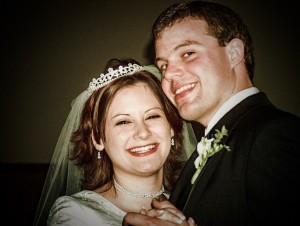
Sunday Spotlight – Elizabeth
Today’s Sunday Spotlight comes from Elizabeth! She discusses what she loves about the church, and her hopes for change in the future.
When I was in high school, I began dating a boy who was Mormon. He didn’t try to be a member missionary toward me or anything – I just noticed that his church was super important to him. After about 6 months or so, I started asking him about it, and he answered my questions and gave me a Book of Mormon. I read the whole thing through (plus the Doctrine and Covenants) and had a strong spiritual experience that led me to wanting to be baptized. My parents were against it, however, so I had to wait until my 18th birthday. At that point, I had managed to complete all 4 years of seminary and my Young Woman Recognition by working on my own at home. The day after my baptism, I left for BYU. My 15th baptiversary is this week.
There are two callings I’ve had that I particularly loved. The first was when I lived in the Foreign Language Student Housing at BYU. I was called to be a Ward Dinner Coordinator. This meant more than just organizing a potluck – every month on Fast Sunday, we’d have a dinner with the theme from one of the foreign language apartments. We’d eat food from one of the countries represented, and the apartment would do a cultural presentation. I worked with them on planning the meal, then had to figure out how to produce it on a large scale and divide it up amongst a bunch of different cooks. We had borscht, paella, homemade hummus among other things and were entertained by capoeira, unique music, and more. It was really an amazing calling and gave me good experience with organizing people that still serves me today.
My other favorite calling was being a Sunday School teacher to the 16-17 year olds. My first year, we were studying the Old Testament, and I had a small class of very bright girls. We dove into the scriptures, going off-manual and learning things that they probably wouldn’t have learned elsewhere. My bachelor’s degree was in Ancient Near Eastern Studies, so it was an exciting chance to use my Hebrew background to really magnify my calling.
I love the service that we give to each other. Whenever there’s a medical emergency, the meals are set up right away. Moving, childcare, etc. – it’s amazing what people will help with. I like knowing that I can depend on my fellow ward members when I need to, and that I can always find ways to help them out.
I also love the mind-blowingly expansive theology that we have. It’s what attracted me to Mormonism in the first place. I love the idea that there is still revelation going on, that we have always existed and will continue progressing after death, that there is a place for everyone in heaven, that God created worlds without end and we’re just one of the many that He’s made. It’s amazing and I wish we’d focus more upon it.
Unfortunately, there are many examples of gender inequality in the Church, some of which I’ve experienced and some of which I’ve only heard about. It permeates every aspect of the Church, though, which has grown increasingly frustrating to me over time. It’s true that there can be some really great people in the church, and through their efforts the sexism is smoothed out a bit, but a system that only works when everyone is on their best behavior is not a very good system. For everyone who can say they’ve had a really good experience, there’s someone who can say they had an equally bad experience.
One major pet peeve of mine is the status of the Relief Society. It’s touted as the largest women’s society in the world, but can you really call it that if it’s overseen by men? We study nothing but the words of men in a women’s meeting, words that our general leaders didn’t even get to choose. The General Relief Society has lost all the autonomy that it once had, all its resources, and now its leaders are rotated out more quickly than some bishoprics.
The most personal concerns for me right now, though, are for my daughters. In just a couple years, the boys in their class will start serving in the church by passing the sacrament and collecting fast offerings, while my daughters will only look forward to sitting passively in the pews each Sunday. In a few years more, they’ll be expected to discuss sex behind closed doors with an older member of the opposite gender, something the boys in their class will never be expected to do.
I am concerned about the messages that they get at church. I was catapulted into Mormon Feminism when my daughter went from wanting to be an artist-ski instructor-lawyer to a stay-at-home mom after a lesson in Primary. I don’t want them to think that they have to abandon their dreams in order to be right before God. Other messages, like the overemphasis on marriage or the licked-cupcake chastity lessons, are just as awful, but something that boys don’t have to face. It needs to change.
I have plenty of other ideas of changes we could make in the Church beyond just ordination! We are locked into a certain kind of church culture, which isn’t necessarily the best way of doing things. One major item that I’d like to see changed is to de-emphasize the 1950’s nuclear family as the ideal our lessons are based around. There are so, so many people who do not fit this idealized version of the family, and it can be hurtful or even damaging to perpetuate this focus. Instead of emphasizing people’s familial status, we need to refocus on our relationships with Jesus Christ.
Further, as a church that touts itself as being family-focused, there are a lot of policies that are not family friendly. Church is terrible for children – it’s not developmentally appropriate to expect them to sit quietly for 3 hours. Sacrament meeting doesn’t even acknowledge their existence most of the time and is the furthest thing from engaging. Instead of structuring church around the needs of the adults, what if we actually thought of the children? Many churches have a children’s time during the service and a class for children during the service, so church becomes something they can participate in and not just endure. Furthermore, the multiplicity of meetings, the practice of packing wards into a single building so they meet in the late morning or even afternoon, and the calling of parents of young children into leadership positions are all things that detract from the family. There are so many policies – not doctrine – that we could change if we truly wanted to be family friendly.
One more change I would love to see is to the calling system. On the one hand, the method we use now allows for leadership inspiration and to let us serve in a variety of capacities that we may not have chosen for ourselves. On the other hand, it also completely disallows for personal inspiration on how to serve and may not take a person’s talents into consideration. I would love to see bishoprics counseling with members to determine where they feel called and capable of serving, instead of relying solely on their own inspiration.
I remember when Ordain Women was first announced in the Feminist Mormon Housewives Facebook group. I was excited, but not confident enough to put up my own profile. I followed Ordain Women closely from its inception, longing to go to the actions but prevented by my circumstances. Finally, when Kate was excommunicated last year, I decided I was done being passively supportive. I wanted to use my voice, so I submitted my profile just a couple days later.
I attended the vigil for Kate up in Salt Lake. My daughters wanted to come along, because they wanted to meet the lady who had the same questions that they did about not being able to serve the sacrament or become bishop. We walked from the park to the grounds of the Church Office Building, then dropped our handkerchiefs and photos at the doors with everyone else. We then returned to the park and participated in a litany, remembering our foremothers in the gospel. I don’t know what kind of impression it made on my daughters, but it touched me very deeply.
I ended up being on Fox News’ coverage of the event, and a former member of the ward posted on Facebook basically saying that I was apostate, a bad parent, and needed to leave. I didn’t know him very well, but it hurt that anyone would say such things about me. Fortunately, the majority of my friends and family who have said anything have been very positive. I’ve reconnected with old friends over a shared point of belief, and many of my friends outside the Church have been impressed by my involvement. I know that I have been luckier than other OW supporters, and I am grateful for that.
I was fairly certain of my beliefs when I submitted my profile – it was only due to fear that I delayed in submitting. Events of the past year, though, have made me even more firm in my beliefs. Women need to be ordained in order to right many wrongs that exist within the church today.
I do see some progress, which gives me hope for the future. The Church has been working on improving its optics with regards to women, and broadcasting the priesthood session over the Internet is a huge change that we can thank Ordain Women for. I know that these changes can feel like baby steps, and it can frustrating that it is moving so slowly, but they are still changes. Whether they want to admit it or not, our leadership has become aware of the issues.
I also find hope as the subject comes up with family and friends. As I mentioned above, I’ve had largely positive reactions to my involvement with Ordain Women – it has actually strengthened my relationship with my in-laws, and I’ve had multiple friends tell me privately that they agree, but they feel that they can’t say anything for various reasons. I think that as long as we keep fueling the conversation, the issue will remain at the top of people’s minds, and we will begin to see more changes in attitudes. At some point, our leadership will take this to the Lord, and I believe that they will be told that women need to be ordained.
Sunday Spotlight – Andrea
Today’s Sunday Spotlight comes from Andrea! Her experience of living abroad gives her a unique perspective.
Tell us more about your connection to Mormonism?
My parents are converts to the church and I was baptized at 12. I lived abroad for a portion of my childhood, so in addition to US-style church, I’ve also experienced “home church,” as practiced by members in extremely rural areas (there was one other member family in the country), and attending services held in languages other than my native language.
Aside from ordination, what are some changes you would like to see implemented in the Church?
I would really like to see women overseeing women and girls, backed by the authority to act. I’ve been deeply uncomfortable in some private interviews with male leaders. As a survivor of abuse, I would much rather be interviewed by a woman, or at least have a woman present. It’s been ingrained in me not to be alone with men, so I often find the interviews and private meetings to be awkward and uncomfortable. I don’t want to be alone with a man I may barely know, but I’m not given a choice.
What prompted you to put up your profile?
My profile was posted July 2014 (1 year!). I had wanted to submit sooner, but I delayed over fear of hurting people I care about. Finally, I decided that for me, at least, submitting was a form of self-care – something I had to do & be truthful about for my own well-being.

at Westminster Bridge, London
Have your feelings grown or changed since submitting your profile?
If anything, I feel more strongly that the church would benefit in many ways if there was greater equality. Members should not be limited in service opportunities due to their sex or gender.
Have you had the opportunity to attend any actions? If so, what was your experience?
I attended the April 2014 action and the vigil for Kate Kelly later that same year. Both experiences were very powerful for me. At the April action, as soon as I took steps into the park where we were meeting, anti-LDS protesters began hurling insults at me, yelling that it was my place to submit to men and calling me homophobic slurs. Peace reigned within the park as we listened & prayed & sang together. We had to pass through the protesters again on our way to Temple Square and their abuses increased. We had to pause at one point to wait for the lights to change to we could cross the street, and I was stopped right in the middle of the pack of protesters. Luckily, after only a minute, the police briefly shut down the crossing traffic so that we could pass quickly. I was so grateful to them. Some may have been LDS, and may have disagreed with our purpose, but they served us by helping us pass through those who would verbally abuse us.

in the stand-by line at the 2nd Priesthood action (October)
As many captured in pictures and on film, it hailed. The comparison has been drawn that we sought shelter and were turned away, and I think many of us felt that keenly at the time. Shelter was there, but we were not welcome to partake of it. I was grateful that we were each given the opportunity to ask for admission, even as we knew we would be rejected. As I waited in line outside the Tabernacle, I’m horrified to say that the insults continued. Members of our own faith, in the very shadow of the Temple of the Lord, yelled at us as they walked by. I heard that I belonged in the kitchen, that I didn’t belong there, and that there was no room for me in the church. I wasn’t welcome.
I came to ask to partake of the Lord’s bounty, and I wasn’t welcome. More than that, my brothers and sisters felt justified in throwing abuses at us as we stood a few feet from the Lord’s house. When my turn came, I asked why my opportunities to serve God were different inside the temple, where I, too, don the robes of the holy priesthood, than they were when I stepped outside. The woman at the door didn’t know, but I was grateful for the opportunity to ask. And I will keep on asking.

Selfie from the 1st Wear Pants (Trousers!) to Church Day.
How have people close to you reacted to your advocacy for women’s ordination? Do you see people’s opinions changing?
My sisters are very supportive. My friends, even before I submitted a profile, covertly ask me questions. They know me well enough to know that I would be involved or know people involve with this movement, so several have asked for my take on events, particularly after the April action. The events of the day were shamefully misrepresented in the media, and I’m glad my friends asked for my opinion so I could set the record straight – that we were peacefully assembled, even while being shouted at, and we simply took our turns asking for admission to hear the Lord’s words. And as we were turned away, we left. I think these types of conversations are the most productive; they’ve given me the opportunity to explain that I’m not demanding anything and that I don’t seek power – I seek opportunity to serve. And I seek answers to painful questions.
Do you live or have you lived outside of the USA? What impact do you imagine women’s ordination having on the church internationally?
I lived abroad for a few years as a child, and am currently living abroad again. I find the church to be very different outside the US than it is inside, and even within US, the church in Utah is quite different from the church outside Utah. It seems to me that the farther I get from Utah, the more tolerance and equality I witness.

at the Ganga River, Baranas, India
Sunday Spotlight – Christiane
Today’s Sunday Spotlight features Christiane who delves into the spirituality of Mormonism and the power of love.
Mormonism runs in my blood. Every part of my name corresponds with a Mormon ancestor. My family left their home countries because they wanted to practice Mormonism. My namesake left Denmark after her family’s home was blazed because they were Mormon. I think of her often when I consider issues of faith.
I spiritually identify as Mormon. Most of my spiritual experiences correspond with the LDS Church. It gives me language and a community in which to develop my personal relationship with God. It is where I learned that family extends beyond biological relatives and that eternity means patience and perspective. It is where I developed the belief that all humans have divine worth and potential. It is the spiritual place that I call home.
My favorite calling was compassionate service leader in a singles ward. In that setting, my primary task was to reach out to sisters who missed Relief Society (women’s group) to check in and share highlights from the Sunday lesson. It took awhile to find my groove in that role, but ultimately, the calling gave me unique opportunities to reflect on Sunday discussions and become acquainted with women in my congregation.
A college roommate once asked: “Do you realize what you have? When you moved to this city without any family and you got really sick, you did not have to wonder who to call. That’s huge.” Now, that speaks volumes about some of the home and visiting teachers I have had – and I hope to be that person to others.
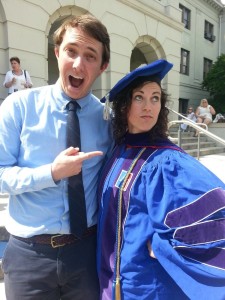
I have been giving talks, serving in Church callings, and participating in social/community events since I was a kid. Not only has that provided me with wonderful opportunities to develop important interpersonal and professional skills, it reinforced early the principle that being part of a community is a give-and-take process.
As a member of the LDS church, I have been taught both that (1) I have divine worth as an individual; and (2) I am capable of doing better tomorrow that I did today. The emphasis on potential through the lens of love is empowering.
A central tenant of my faith is that we can be perfected through the Atonement of Jesus Christ. I am capable of becoming more empathetic, courageous, discerning; change is a possibility – for me and for everyone around me. This possibility motivates every aspect of my life: family relationships, professional advocacy, repeated attempts at team sports, etc. I believe that true change does not occur often or easily. But it does happen. That possibility for change coupled with God’s perfect love gives me hope for the future.
As I have a long way to go individually, we have a long way to go collectively as a Church. There are major issues we need to tackle more aggressively, such as racism – institutionalized and otherwise. But in the interest of brevity, I will comment on one change that I would like to see implemented immediately: temple ordinances. The temple is a sanctuary for me – a place of spiritual refuge and mental clarity. I would like to see language eliminated from temple ordinances that suggests women are subservient to men or cannot communicate directly with God. This language is distracting and incongruent with the gospel as I understand it.
Putting a profile on ordainwomen.org was a prompting that started in, let’s say, March 2013 and continued until February 2015 when I actually posted my profile. You know, like a Jonah and the Whale sort of situation?
Two particular moments stand out to me:
The first one took place in an Institute class at my law school. It was a small group and I was the only woman. The teacher brought up the topic of women’s ordination in the context of pride and power-seeking. The conversation was lengthy and included several comments about women’s roles. Nobody asked my opinion or acknowledged my silence. When I finally spoke up to say only that I could see why a righteous woman might seek priesthood ordination for reasons other than pride, the tension was palpable. I am fortunate that institute class was the first time I have truly felt like an outsider in my own faith community. This experience increased my empathy for sisters and brothers who (regularly) feel marginalized in the Church.
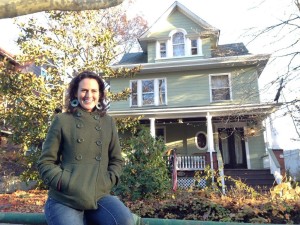
The second took place in a Sunday School class in my singles ward. The conversation had turned to speculation about why women are not ordained to the priesthood. I commented that we do not know the specific reason why women are not ordained and that we should keep our hearts open so that we may be receptive to future revelation, if and when it comes. When I looked down, there was a small piece of paper in my lap that said: “Thank you.” This experience increased my desire and confidence to raise my voice and honestly express my thoughts in solidarity with sisters and brothers who share my hopes.
In a word, I saw my sisters and brothers hurting. I saw that I was benefitting from their courage and doing little to contribute. That felt wrong.
My family and friends have been incredibly supportive. Wonderful conversations have stemmed from posting a profile. Many people have openly supported my actions. For the most part, friends and family who disagree with me have been courteous and tolerant. This has been a blessing and an affirmation of hope.
I had a wonderful conversation with my mom shortly after I posted my OW profile. Talk about a woman I admire for strength, intellect, faith, and pluck. She was hesitant to bring up the subject and seemed concerned that my profile was the beginning of my exodus from Mormonism. We talked for almost two hours about her experiences growing up in the fifties and sixties and becoming a mother of eight children in the decades that followed. We talked about her relationship with other women in the Church and her difficulty finding a place among them. We talked about the contrast between her activities outside of the Church and within the Church. We talked about faith, self-doubt, equality, family, love . . . you name it. I will remember that conversation for a long time. It strengthened my resolve and faith in the future of women’s ordination and gender equality in the Church.
Sunday Spotlight – Jen
Today’s Sunday Spotlight comes from Jen! She shares about her experience being at two of the General Conference actions, how she loves the church and how it is who she is.
- What gives you hope for the future
I give myself hope for the future. I feel as though I have gifts and power given to me to help move some radical ideas forward with my brothers and sisters. My children give me even more hope for the future. They readily accept things like same-sex marriage and gender and racial equality and are genuinely perplexed by the rhetoric they hear that discounts those things. I feel that as we, collectively and individually, live by our internal compass, we will see change and we will be able to move these mountains, little by little.
- Aside from ordination, what are some changes you would like to see implemented immediately in the Church?
I would like to see same-sex marriages recognized. Enough already with the “traditional marriage” rhetoric and the strict gender role entrenchment. I’d like to see women in more callings that are not gender or priesthood dependent. There is nothing inherently male about being a ward clerk or an executive secretary or a Sunday School president. Likewise, I’d like to see Primary be less of a woman-dominated place. I’d like to see leadership focusing more on global issues like working to end human trafficking, helping to heal the racial terrorism happening now, and working to educate women worldwide.

- Tell us more about your connection to Mormonism?
I’m a 7th generation Mormon. I was raised in the Church and graduated seminary and served a mission. It is my culture. My family. My spiritual language. I feel like no matter where I go in life, this is what grounds me.
- What are some of the things you love about the Church?
I love the focus on service. I love that when we do Christianity right, we really do it right. But most of all, I love what Claudia Bushman said when she was interviewed on Lindsay Hansen Park’s great series on polygamy. She said this about Mormons as a whole: “We come from a crazy stock of people. We do things that were impossible, but we do them.” I love this. It describes so perfectly the cultural propensity to dream big, to work hard, to believe that we can do whatever it is that we set forth to do. Joseph translated an entire book, Nephi built a ship, the pioneers crossed the plains against incredible odds to settle a land that was hostile at best. I believe the time will come when women will be ordained. I love that in this Church, you can never say never.

- What prompted you to put up your profile?
I have always noticed the inequality within the church, but been able to manage it for myself. Then I had a daughter after having two sons. One day in sacrament meeting when she was two years old, she saw our babysitter, a male, passing the sacrament. She said, “I’m going to do that!” Her older brother, who was 4, said, “No, you can’t. You’re a girl.” I realized then how much patriarchy hurt not only women, but also men. My children were learning things that directly conflicted with my personal values and my view of spirituality. I recognized that the change needed to start with me, doing something much more than just managing my own dissonance. Sometimes the things we are unwilling to do simply for ourselves we do much more readily when we see the impact it could have on others.

- Have your feelings grown or changed since submitting your profile?
Absolutely. I went on a mission after I read Abraham 1:2. I didn’t realize at the time that the scripture was specific to ordination. It just made sense to me. I really wanted that happiness and peace and knowledge. After I submitted my profile and attended both actions, I’ve had the opportunity to acquaint myself with the Roman Catholic Women Priests in my area. I went to a screening of “God’s Daughters,” a documentary that follows their journey in ordination. I had the most amazing experience talking with them and seeing in them what I hoped for myself and for those around me- a future where women are ordained, where gender and racial equality and social justice intersect. I felt hopeful. I still feel hopeful, even though it seems like a distant goal.

- Have you had the opportunity to attend any actions?
I attended both actions at General Conference. My first action was amazing and heart breaking. It was incredible to be with people who shared the same vision. It was also really difficult. I have had experiences of being unwanted in a certain place because I was female. However, I’d never been outright told that I could not be there. This was the first time I’d experienced being turned away from something because I was female. Standing at the door, asking for entrance to something that anyone else, simply by the virtue of being male- not even being a member of the church- could gain access to and being told no was against everything I had ever envisioned of my Heavenly Parents or Christ. Then, when the garbage truck driver drove between us and the entrance and smirked, it just made it sting even more. It was, however, so beautiful to hear the voices of those around me singing hymns together afterwards, sharing our collective experience and holding fast to hope.
Sunday Spotlight – Hannah
Today’s Sunday Spotlight comes from Hannah! She so eloquently expresses how silence can equal agreement and the need to take a stand and voice your opinion, even when you may be in the minority!
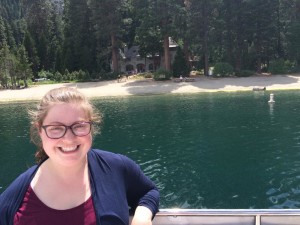
What gives you hope for the future?
The small changes I see, like the inclusion of women in planning sacrament meetings give me some hope. But mostly what gives me hope is I see more and more people seeing the problems with the way we treat women in the church.
Tell us more about your connection to Mormonism?
I was born (of goodly parents!) into Mormonism, and was raised in a fairly progressive family. We were Sunstone Mormons if you know what I mean. I felt a lot of angst in my adolescence and young adult years trying to reconcile my testimony and love of the church with attitudes and policies that I felt were oppressive and wrong.
What was your favorite calling?
My favorite callings are working with the young women and teaching relief society.
What are some of the things you love about the Church?
I love Mormons. I love the community, and the goodness and the commitment that you find from church members. I love the teachings of Christ, of the atonement, and I love the concept of Heavenly Mother.
What prompted you to put up your profile?
When Ordain Women launched back in 2013, I was quietly excited. I strongly believed in the need for women’s ordination, but I didn’t feel especially called to the priesthood myself. I was excited that people were fighting for this, but I didn’t really feel like it was my fight. That changed in March 2014 when I read the response to OW’s request for tickets to the priesthood session from the Church PR department. Two sections really stood out to me. The first was:
“Women in the Church, by a very large majority, do not share your advocacy for priesthood ordination for women and consider that position to be extreme.”
The second was:
“Your organization has again publicized its intention to demonstrate on Temple Square during the April 5 priesthood session. Activist events like this detract from the sacred environment of Temple Square and the spirit of harmony sought at General Conference. Please reconsider. If you feel you must come and demonstrate, we ask that you do so in free speech zones adjacent to Temple Square, which have long been established for those wishing to voice differing viewpoints. They can be found on the attached map. As fellow Latter-day Saints and friends of the Church, we invite you to help us maintain the peaceful environment of Temple Square and ask that you please follow these details in your continued planning. In addition, consistent with long-standing policy, news media cameras will not be allowed on Temple Square during General Conference.”
Those two quotes hit me in the gut. The first was so dismissive and shaming, and on top of that, who cares if most of the church thinks the position is extreme? Just because an opinion is a majority one doesn’t mean that it’s the right one. The thing that really got me is that I knew that I was implicitly being included in that majority, simply because I hadn’t spoken up about what I really believed. I didn’t want to be included in “the very large majority”, because I believed (and still believe) that they are wrong. That is what prompted me to write my profile.
The second quote is what prompted me to attend the priesthood action at temple square. Requesting, that faithful members of the church stand outside with the people who come every year to taunt, to yell to hate, was a slap in the face. It is not ok to say that women don’t want the priesthood, and then when a group of women prepares to demonstrate that they want the priesthood, tell them please don’t demonstrate that.
What has been the reaction of your ward/ family/friends?
My family and friends have been really great for the most part. I have a lot of extended family who don’t agree with me, but they are really respectful for the most part. We don’t really talk about it much, although I would be happy to have more of a dialogue with them about my beliefs, I also don’t want to make them uncomfortable. Interestingly, I’ve gotten lots of messages from family and friends who aren’t Mormon, who are really supportive. It’s been really cool to see how much people who aren’t connected to the church are invested in this, and are watching to see what happens.
My ward has been pretty cool with my involvement. Although, last year when I was teaching a lesson on the priesthood to the young women a bishopric member spontaneously showed up to listen in. (I managed not to corrupt the youth, and all was well.) When my profile went up I was in the Young Women’s presidency. A few months later I had a baby, and went on a little hiatus. (My baby was born the week after Kate Kelly was excommunicated, which provided a convenient opportunity to step away from church for a bit.) While I was on my maternity leave the Young Women’s president called me and we ended up talking about my involvement with Ordain Women, and she told me she was cool with it, but to please not talk about it with the young women at all because she thought that was inappropriate. I totally get where she was coming from, and she was very nice and respectful about it. Ultimately I decided to resign that calling. I am just not in a place anymore where I am willing to censure myself about women and the priesthood. I don’t really think it’s a fair request.
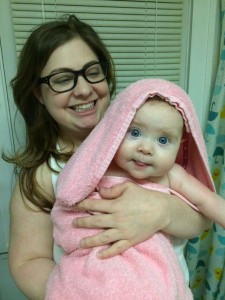
Have you had the opportunity to attend any actions? How did they effect/change you?
The priesthood action in April 2014 came with very bad timing for me. I was six months pregnant at the time, and I have rheumatoid arthritis that makes it difficult to stand for long periods. I live in Cleveland, Ohio, and I couldn’t afford a ticket for a one day trip to Salt Lake City. But I knew that I needed to be there. I received funding to help cover the cost of my trip, and the ticket was booked. April Young Bennett loaned me a wheelchair so that I would be able to make the trip from City Creek Park to Temple Square, and then wait in that line of 500 people.
I remember that before we left the park, we sang a hymn, and I was filled with such peace. There was so much love in that group. I felt surrounded by the spirit. Two dear friends of mine were with me, and pushed my wheelchair in the rain and hail I carried names in my pocket of people who wanted to attend but couldn’t, including my father and my sister.
When it was my turn at the doors to the tabernacle, I said what I came to say. That I wanted to go in, that I wanted to listen to the words of the prophet, that I wanted women to be able to fully participate in our church, that I wanted my daughter to be born into a faith where she was valued as much as any man. Like all the women before me, I was turned away. And it was sad, but knowing I had put my own face and name out there to say what I truly believe took the sting away. I left that day feeling energized and hopeful.
That all came crashing down when I read the statement released by the church PR department. The way they characterized the event was totally untrue. The part that particularly galled me was the statement that we would not leave when asked. Maintaining respect and reverence was important to us, and the plan was to leave immediately if asked. We were never asked to leave. At least, not that I heard or saw. In fact, they had a little area roped off for us to wait in line, which seems like an odd step to take if you are planning to ask people to leave.
I spent the next day quietly sobbing in the Dallas airport while I listened to general conference on my phone. It was hard to reconcile the messages of love and truth with the hurtful and dishonest treatment I had just received. It’s still hard to reconcile that.
I haven’t attended church regularly for about a year now. I really felt the need to step away and get some perspective. I have lost a lot of trust in the leadership of our church in the last two years. I don’t expect perfection from the prophet or the apostles. They are just human beings, like all of us. I think they love the church members a lot. But while I don’t expect perfection, I do expect accountability and transparency, and I think those two thinks are sorely lacking.
Although I’m not currently attending church, I consider myself fully, actively Mormon. This is my church, and I still love it. I may have lost trust, but I still have a lot of hope. I truly believe that Mormon Women should and will someday be ordained.






